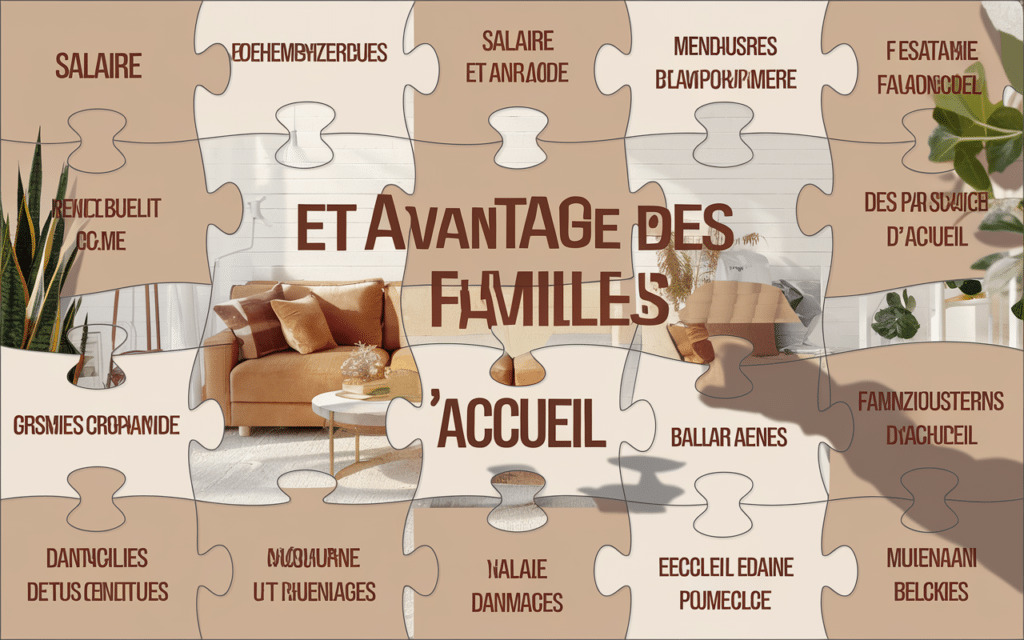- 👨👩👦 Being a host family: a heartfelt commitment and an important decision!
- 💶 Find out the financial details: salary, benefits, and allowances.
- 🧩 Let’s decipher the puzzle of basic remuneration and its increases together!
- 📅 Learn how to manage leave, absences, and flexibilities with the ASE.
- 🤝 Benefit from a support network and valuable information for your adventure.
Become host family is an important decision that raises many questions, particularly on a financial level. You may be wondering what your salary will be and what benefits you can expect? This is completely normal and legitimate. After all, welcoming a child into your home involves additional responsibilities and costs.
In this Complete Guide to Host Family Salary and Benefits, we will detail all the financial aspects of this noble mission. From basic remuneration to specific allowances, including leave and social protection, you will discover all the compensation provided to support your commitment.
Whether you are already a host family or are considering becoming one, this article will provide you with all the essential information to understand how your dedication will be financially valued. Let’s dive into the details of this very special remuneration together!
Understanding Host Family Pay
Wondering how the salary of a host family works? This is a crucial question for those considering this path. Paying for host families is a complex system, but don’t worry, I’ll explain everything to you!
Let’s start with the basics. A foster family’s salary is made up of several elements. Think of it as a puzzle where each piece is important. First, you have a basic salary, then specific increases, and finally allowances to cover the costs related to welcoming the child.
Did you know that according to the latest data from Child Protection, the average salary of a foster family in France varies between €1,200 and €2,000 net per month? But be careful, this figure can vary greatly depending on several factors.
Calculate the basic salary
The basic salary is the basis of your salary. It is calculated according to the number of children welcomed and the number of days of care per month. For example, for a child welcomed full-time, you can expect a base of around €1,000 per month.
But that’s not all! Your experience and qualifications can influence this amount. Have you already followed specific training? If so, this could increase your base salary.
Understanding specific increases
Now, let’s talk about the little extras that can boost your salary. Specific increases are bonuses granted in certain situations. For example, if you take in a child with special needs or if you work during school holidays.
These increases can represent up to 50% of your base salary. Imagine the impact on your final salary! It’s like a little boost to recognize your additional commitment.
Managing intermittent and temporary care
Sometimes, you may be asked to take in a child for a short period of time or on an irregular basis. How does it work in this case? Well, the Caisse d’Allocations Familiales (CAF) has set up a special system for these situations.
For intermittent foster care, your compensation will be calculated in proportion to the time spent fostering. It’s like a salary on demand! For temporary foster care, you could benefit from an increase to compensate for the flexibility required.
You see, being a foster family also means knowing how to juggle different types of compensation. But don’t worry, the departmental child welfare services (ASE) are there to guide you through these sometimes complex calculations.
What are the allowances and costs associated with foster care?
Now that we’ve broken down your salary, let’s talk about the extras! As a foster family, you don’t just receive a salary. You also receive allowances to cover the costs associated with fostering the child. It’s a bit like having a special budget to ensure the well-being of your little protégé.
Detail maintenance allowances
Maintenance allowances are there to cover the daily expenses related to the child. Food, clothing, leisure activities… everything is included! On average, these allowances amount to around €13 per day and per child. But be careful, this amount can vary depending on the age of the child and the region where you live.
For example, if you are hosting a teenager, the allowance will generally be higher than for a young child. Logical, right? A teenager eats more and has different needs. These allowances are crucial to provide a comfortable living environment for the child without impacting your personal budget.
Managing the coverage of exceptional expenses
What if the child needs glasses? Or if he goes on a school trip? Don’t panic! There are systems to cover these exceptional expenses. The Child Protection has provided a reimbursement system for these out-of-the-ordinary expenses.
To benefit from these reimbursements, you will generally need to obtain prior approval from the ASE. It’s a bit like asking a parent’s permission before a big expense. Once agreement has been obtained, you can be reimbursed upon presentation of invoices.
Did you know that some departments even offer specific payment cards for these expenses? It’s practical and avoids advance fees. Do not hesitate to contact your ASE representative to find out the exact conditions in your region.
How to manage constraints and specific cases?

Being a host family also means facing special situations. How is your salary impacted when the child is in boarding school? Or when he spends time with his biological parents? You are probably asking yourself these questions. Let’s see together how it works.
Apply the rules when staying at a boarding school or with parents
Let’s imagine that the child you welcome spends part of the week in boarding school. In this case, your remuneration will be adjusted according to the number of days the child is actually with you. It makes sense, right?
For example, if the child is in boarding school from Monday to Friday and at your home on the weekend, you will receive remuneration proportional to these two days of reception. But be careful, you remain “available” all week, which is taken into account in your base salary.
When the child spends time with his biological parents, the principle is similar. Your salary is maintained, but maintenance allowances are suspended for these days. It is a system that recognizes your ongoing commitment while adapting to the realities of reception.
Calculate remuneration in the event of suspension or interruption
Sometimes reception may be suspended or interrupted. So what happens to your remuneration? Rest assured, measures exist to protect your income in these situations.
In the event of a temporary suspension (for example, if the child is hospitalized), your base salary is generally continued for a certain period of time. This duration varies depending on the department, but it is often 3 to 4 months. It is a way of recognizing your commitment and your continued availability.
If reception is permanently interrupted, you benefit from waiting compensation. This represents around 70% of your usual salary and can be paid for several months. It’s an important safety net that helps you navigate this transition.
Remember that every situation is unique. THE social workers and the ASE services are there to guide you and help you understand your rights in these particular situations. Don’t hesitate to ask for them!
What are the rights, leave and benefits of host families?
Being a host family isn’t just about the salary. It also means benefiting from significant rights and social benefits. You may be wondering what these benefits are? Let me enlighten you on this crucial subject.
Plan your leave and absences
Everyone needs a vacation, even everyday superheroes like host families! You are entitled to paid leave, like any employee. In general, this represents 2.5 working days per month worked, or approximately 5 weeks per year.
But how does it work in practice? Well, you must plan your leave in agreement with the ASE services. It’s a bit like a puzzle to solve: you have to find the right time that suits you, the child, and the social services.
What if you get sick? Don’t panic! You benefit from daily allowances in the event of sick leave. It’s reassuring to know that your health is taken into account, isn’t it?
Remember that the National Federation of Child Protection Associations can provide you with detailed information about your leave and absence rights. Do not hesitate to contact them to find out more!
Being a host family is a commitment of the heart, but it is also a job with its rights and advantages. Understanding your remuneration and benefits will allow you to focus on what is essential: the support and well-being of the children you welcome. Remember that you are not alone in this adventure. Social services, associations and other host families form a valuable support network. So, are you ready to embark on this great adventure?
Ready to embark on this great adventure?
Throughout this article, we have explored together the different facets of host family remuneration, from base salary to specific allowances, including social benefits. As you have understood, being a host family is much more than just a job: it is a real vocation which deserves fair and equitable recognition. Child Protection and departmental services are there to support you at every stage of your journey, transforming what might seem complex into a rewarding adventure.
Useful links
- Family assistant (host family): remuneration – Public Service
- Remuneration of a family caregiver – This Family
- Host family salary and benefits: everything you need to know 2024 -Sirteq
- How much does a host family (family assistant) earn? – FAFPT
- Google Position Zero: The Ultimate Guide to Hoarding Featured Snippets - 1 March 2025
- SEO 2025: trends to follow to optimize your content strategy - 1 March 2025
- Business management training: The keys to success - 2 January 2025





